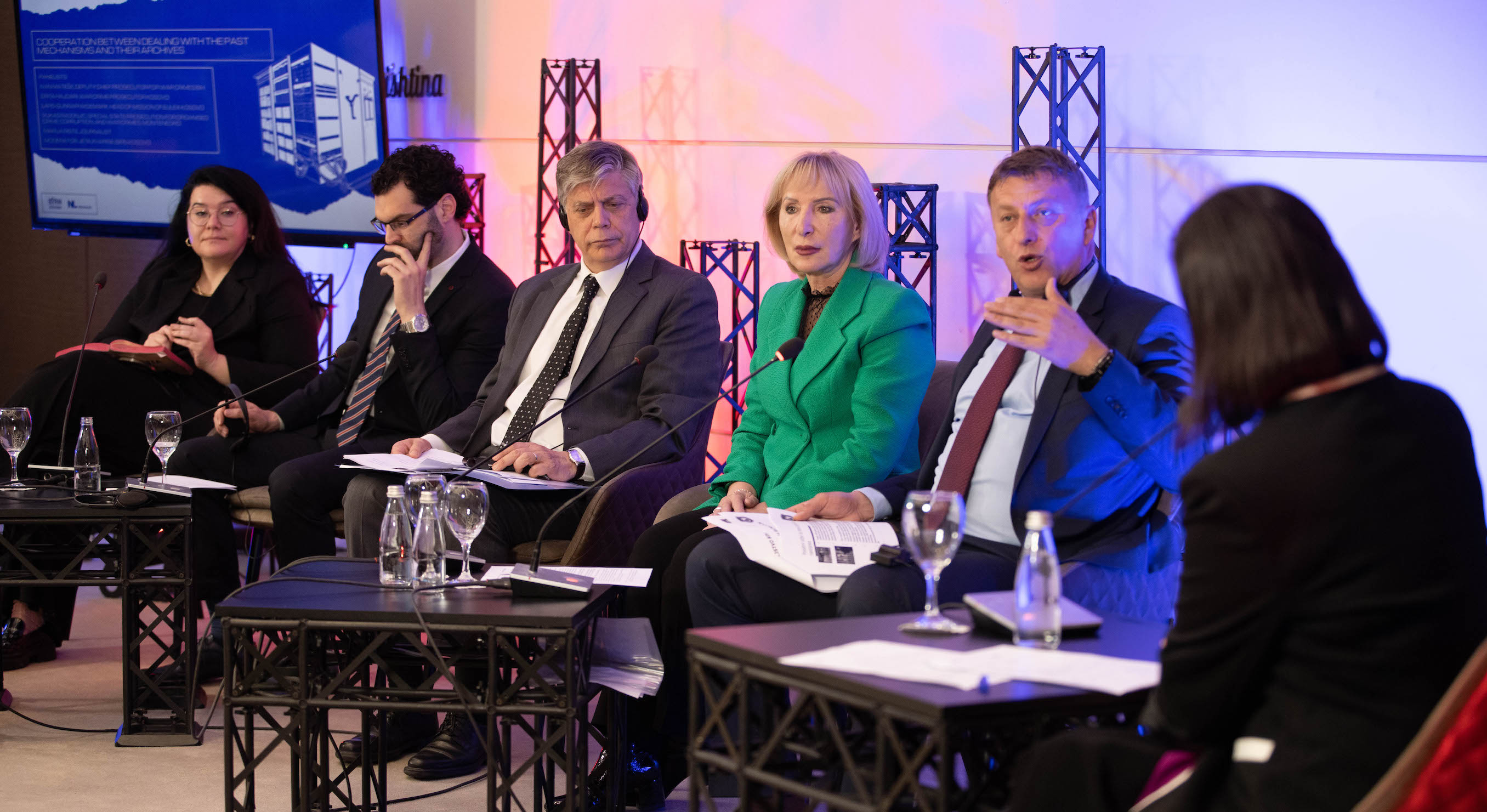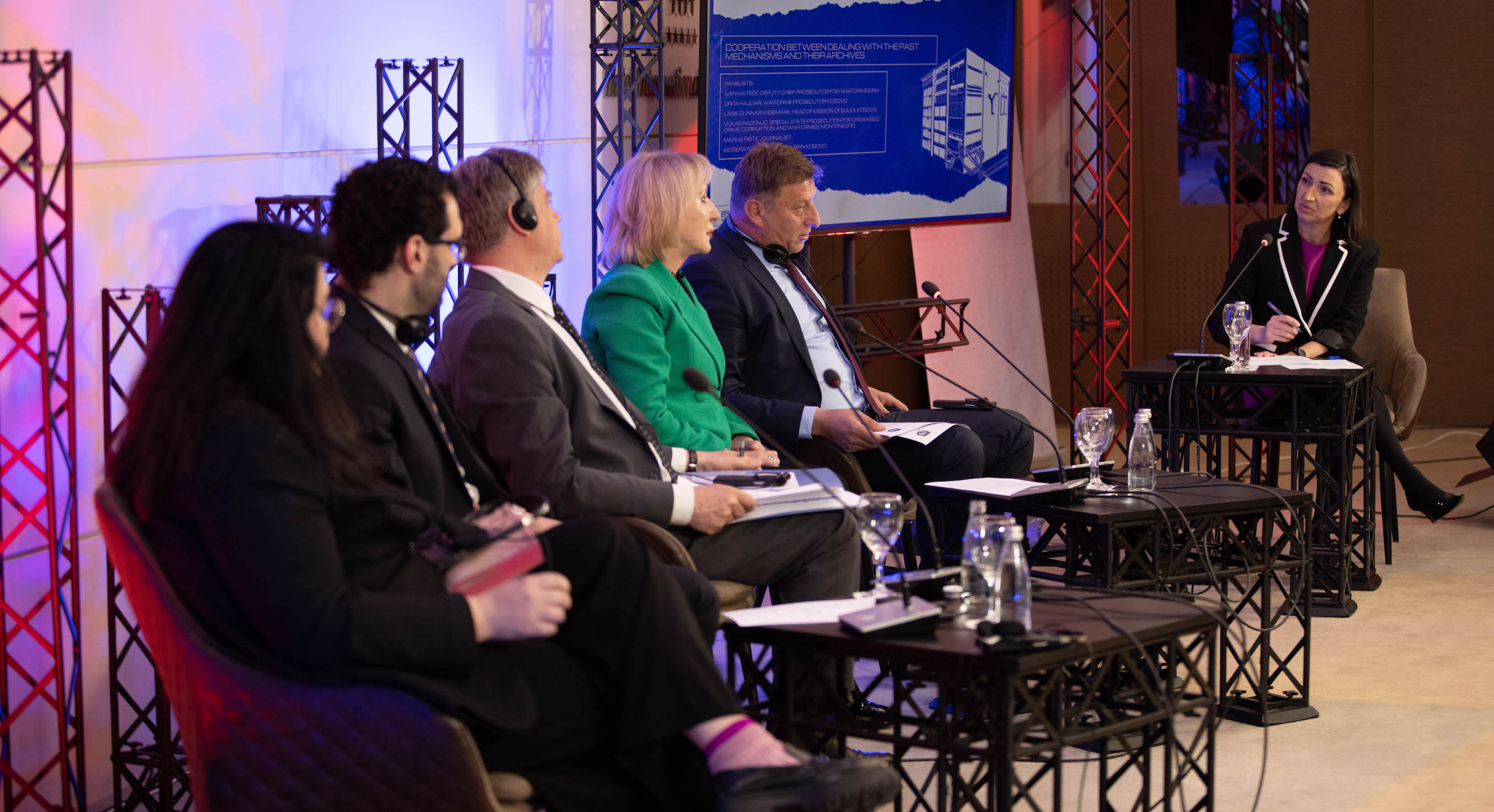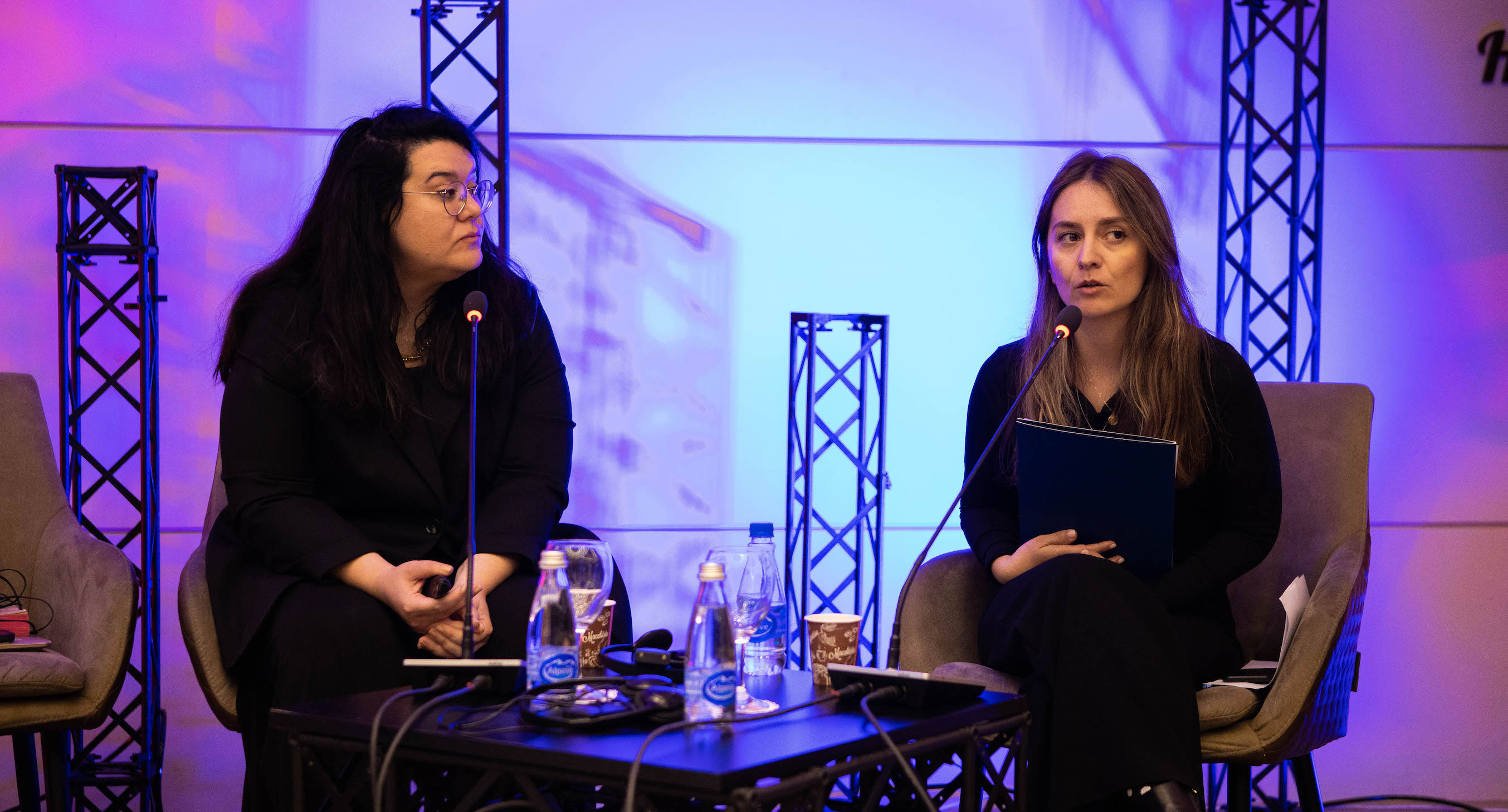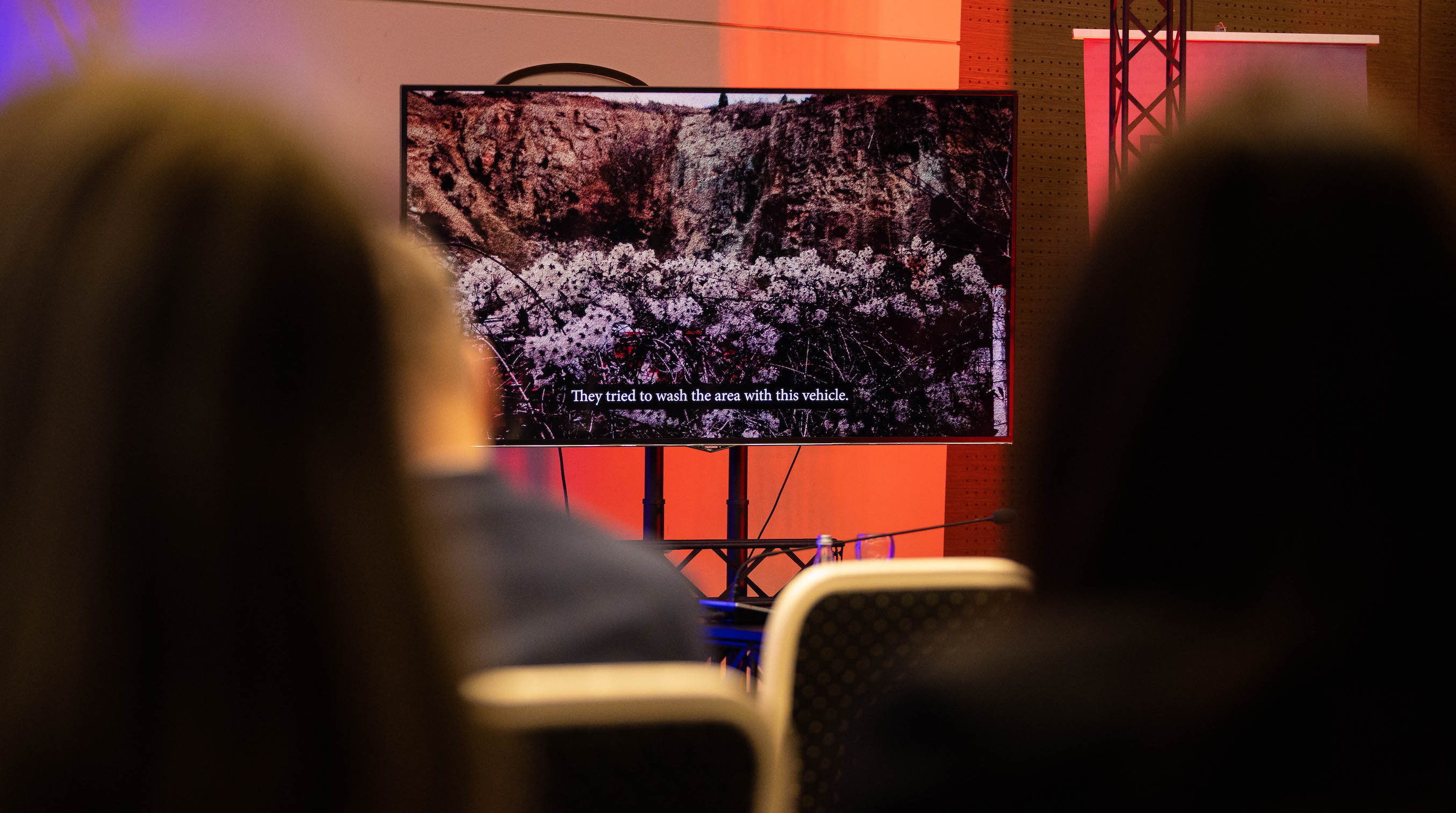At a conference organized by BIRN Kosovo, experts highlighted the importance of improved cooperation among regional prosecutors dealing with war crimes. They emphasized the need to build trust in regional courts, take prompt action before witnesses pass away, increase the number of prosecutors dedicated to war crimes, and recognize the vital role of archives in solving these cases.
A conference titled “Archives and Conflict Prevention: Lessons from the Past, Visions from the Future,” organized by BIRN Kosovo, brought together regional experts in Prishtina on Friday. The conference emphasized the need to recognize past atrocities and war crimes, as well as the importance of increased cooperation and trust in both local and regional courts.

Photo: BIRN.
Ivan Matesic, Deputy Chief Prosecutor for War Crimes in Bosnia and Herzegovina, highlighted the significant number of indictments related to war crimes that have been filed in his country.
“In the Bosnian prosecutor’s office, we have accused more than 1,000 individuals, resulting in sentences totaling over 3,500 years. We have also dealt with six cases of women convicted of war crimes. Bosnia has over 370 prosecutors working across the country,” he stated.
Matesic further emphasized that many perpetrators of war crimes do not reside in Bosnia.
“These individuals do not trust the judicial systems of other countries. In Serbia, we have recently seen several cases prosecuted that we have accused. I personally accompanied a witness who had been raped to Serbia to provide her with assistance,” he added.
Matesic pointed out that the major challenge lies in prosecuting the high-ranking individuals who held commanding positions during the war. However, he noted that they face more difficulties with Croatia due to its EU membership.
Drita Hajdari from the Special Prosecutor’s Office of Kosovo highlighted the shortage of prosecutors in the country when it comes to handling war crimes.

Photo: BIRN.
The Special Prosecutor’s Office received all war crimes cases from EULEX in 2018, at which time there were only two prosecutors. The number has now increased to four, but according to Drita Hajdari, it is still insufficient to handle the existing caseload.
Hajdari emphasized that Kosovo faces significant challenges in international cooperation due to its political status.
“We often encounter silence and rejection of our requests. Serbia refuses to cooperate and does not respond. The Hague has informed us that they cannot cooperate since they were established by the UN, and as Kosovo is not a member, they cannot engage in cooperation,” she added.
According to Hajdari, Serbia remains silent and unresponsive to their correspondence, arguing that it does not reflect the government’s position.
“We also do not respond to Serbia’s demands since the Special Prosecutor’s Office of Kosovo has jurisdiction over crimes committed within the territory of Kosovo. There are cases where both countries are investigating the same incidents. Double sentencing cannot be applied,” Hajdari emphasized.
She stated that judgments in absentia provide some measure of satisfaction for the victims.
Lars Gunnar Wigemark, the head of the EULEX mission in Kosovo, explained that they inherited numerous war crimes cases from the UNMIK mission, most of which were transferred to the Special Prosecutor’s Office of Kosovo in 2018.
“During EULEX’s tenure in handling these crimes, the number of prosecutors ranged from 5 to 8. Within this period, 41 convictions were secured, with 38 obtained by EULEX prosecutors. The mission has submitted hundreds of active cases to Kosovo institutions, many of which were inherited from UNMIK. It is very important to say that there is not enough regional cooperation,” he stated.
Meanwhile, Vukas Radonjic, the Special Prosecutor for Organized Crime, Corruption, and War Crimes in Montenegro, highlighted that the challenge in Montenegro stems from its lack of direct involvement in the war, leading to a limited understanding of these crimes.
The first war-time trial in Montenegro commenced in 2014, involving five individuals, and there are also cases of deportation, stated the official.
He further noted that the passage of time significantly affects memory, often resulting in testimonies that are inconsistent and unverifiable.
“NGOs dedicated to processing war crimes mark the dates of these crimes each year, provide testimonies, and offer cooperation. We have two prosecutors specializing in these crimes, and we currently have no more than 20 criminal cases,” he added.

Photo: BIRN.
Marija Ristic, digital investigative journalist from Amnesty International and former executive director of BIRN, said that the main problem that everyone knows but doesn’t talk about much is Serbia.
“The elephant in the room is that we don’t have the authorities of Serbia here and this speaks volumes. They did not agree to be in the same country as the Kosovar side. There are cases when there is cooperation, the way Serbia cooperated with Bosnia is manipulative as complex cases were left out. There is also a lack of trust,” she declared.
According to Ristic, Serbia tends to glorify and honor commanders who are responsible for numerous crimes.
“In Serbia, commanders accountable for war crimes roam free and even appear on television. There is no political will to hold them accountable, as these individuals still hold positions within the decision-making elite. Even retired personnel wield significant influence due to their knowledge of people and events,” Ristic added.
The archival preservation of war evidence was deemed crucial, as many judicial proceedings rely on these documents.
Vladimir Milanovic from the Humanitarian Law Center in Serbia mentioned that they have collected 19,000 victim statements from Bosnia, Kosovo, and Croatia.
“These statements have been used in numerous court proceedings. In 2005, we signed an agreement with the Hague tribunal and digitized all trial records for proper documentation,” he stated.
Meanwhile, Bekim Blakaj from the Humanitarian Law Center Kosovo expressed his initial lack of awareness regarding the potential use of documents containing confessions from different individuals.
“Unfortunately, the judiciary has failed to deliver justice to the victims,” he said.
According to him, the archives hold significant value, as current narratives are often constructed on a national basis rather than being based on evidence.
“The authorities’ archives remain inaccessible, but they could assist in the identification of mass graves, at the very least,” he further added.

Photo: BIRN.
During the conference, the documentary “Bitter Land” was screened, which explores 48 mass grave sites in Bosnia, Kosovo, and Croatia.
It was highlighted that many locations where mass graves were discovered lack memorial markers.
The conference also delved into the cultural impact of archives on society and the selective remembrance and forgetting of historical events through these archives.
The former Yugoslavian countries possess parallel archives with different perspectives.
Nikola Diday, from Swisspeace’s Dealing with the Past Program, expressed concerns about the potential dilemmas posed by technological applications in terms of the accuracy of these archives.
“The role of the Internet is also a contentious issue. Differentiating truth from falsehood is crucial, as these archives can be susceptible to misuse,” he stated.
Meanwhile, Nikola Mokrovic from the Center for Documenting the Past in Croatia stated that his country views the handling of war crimes as a completed task.

Photo: BIRN.
“Frustration arises because trials are still ongoing, and many have been held in absentia. There is a lack of willingness to cooperate, as Croatia believes it has fulfilled its responsibilities. We still have a significant number of missing persons,” he explained.
The use of technology in gathering evidence related to war crimes was also discussed, with a specific focus on the war in Ukraine and the documentation of affected areas.
Maryna Slobodianiuk, who heads the investigation department at the Ukrainian NGO Truth Hounds, emphasized the substantial assistance provided by technological tools in documenting events in Ukraine.
“We have collected witness statements online, as there is no other viable method. The use of drones is also highly valuable, as they provide clear visual representations of the affected areas. Digital evidence proves particularly useful, especially in the case of Ukraine,” she stated.
Luljeta Progni, founder of Kujto, Online Archives of Victims of Communism Albania, shared that they have digitized data for over 50,000 victims of the communist regime.
“This is an unprecedented undertaking in modern history. We explore how to digitize evidence for cases that occurred several decades ago, such as the crimes committed in Albania during the communist era,” she declared.
The conference also underscored the need for caution in using these digital tools for journalism.





